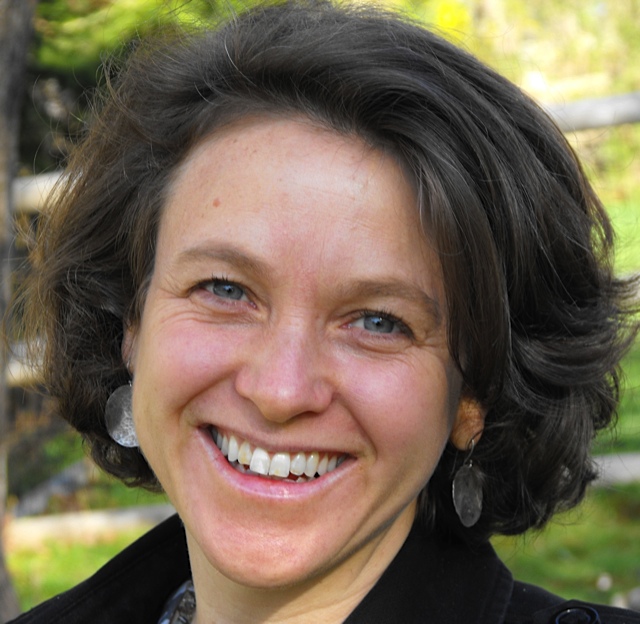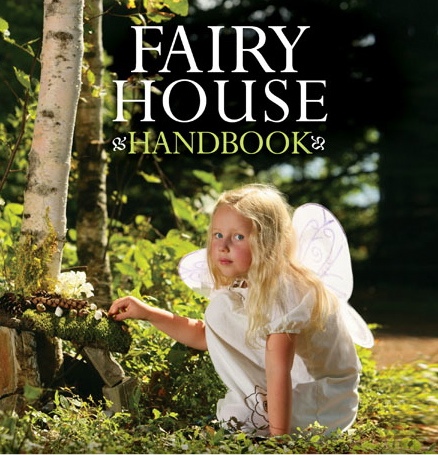
Don’t let fear hold you back. Move forward with trust instead of fear.
1. What led you to the mission of being a writer of fairy house books?
A publisher was looking for a writer of fairy house books. I accepted the opportunity. It was a combination of the lifetime loving of little houses, fairies, and writing. I’m a librarian and have read so many books for children, so getting a chance to write a book for children and use a voice that I knew they would respond to, was a dream come true.
I grew up with a mother who really encouraged us to be outside. We always built little mouse houses, snail houses, and sand castles for the crabs. I built these little houses in nature, but hadn’t learned about fairy houses. My daughters discovered fairy houses when we moved to Maine about five and half years ago. This topic just seized my imagination. I have been enchanted with them ever since.
A fairy house is a little house that is made in the woods or another natural area and is built of natural  materials. You gather the materials and create a house made out of things you find in nature. You could use bark as the walls and moss as a roof and stones to make a little pathway. Kids, adults, and people of all ages get completely carried away. They can make furniture, swimming pools, swing sets, and all kinds of things. The book I have written has projects and all kinds of things or possibilities of what you can do to build a fairy house. (See excerpts: The Fairy House Handbook by Liza Gardner Walsh or go to the homepage: Fairy House Handbook.)
materials. You gather the materials and create a house made out of things you find in nature. You could use bark as the walls and moss as a roof and stones to make a little pathway. Kids, adults, and people of all ages get completely carried away. They can make furniture, swimming pools, swing sets, and all kinds of things. The book I have written has projects and all kinds of things or possibilities of what you can do to build a fairy house. (See excerpts: The Fairy House Handbook by Liza Gardner Walsh or go to the homepage: Fairy House Handbook.)
My children were a huge inspiration in writing this book. I had to pay attention to what draws them in. My librarian work also helped because I learned what the wider range of children in the community are interested in. Writing is a technical endeavor that requires organization and I had to learn the basics of successful writing and acquire a voice in my writing. Then I had to learn how to edit my writing and understand the whole process of publishing a book.
My advanced degree is in writing – a master’s of fine arts. Also helpful was teaching creative writing. I’m currently teaching at the high school level. I would also encourage aspiring writers to read. I tell my students that you really need to read anything and everything to become a good writer. To write the Fairy House Handbook, I read everything I could about fairies and about building little houses. Reading as a writer is a very important skill.
2. What does this mission mean to you?
This mission is wonderful. It’s a dream come true. It combines so many things that I love and is a real synthesis of a lot of things in my life. It is opening the door to all kinds of other opportunities for me. It’s been a really wonderful dream come true.
One of my dreams was to encourage children to be in nature, so a part of my mission is to get kids outside. I’ve been able to be outside for hours with children and watch them build fairy houses. They become completely satisfied because this play sparks all their creative juices. They use the natural resources around them. That’s such an incredible thing to see.
Another great book to get children outside is called Mud Pies and Other Recipes by Marjorie Winslow. It’s one of my favorite books and was first copyrighted in 1961. In the book, there are all these amazing mud pie recipes using grass and other natural ingredients. It’s wonderful. My kids have the book and they take it out on the porch and follow the recipes. They make grass soup and stone sandwiches. We’ve had a lot of fun with that book.
3. What was your best day as a writer of fairy house books?
My best days are when I have the book in my hand and a child comes up and says, “I just love your book! Will you sign it for me?” I sign it and write, “For many fairy house adventures.” Then I write the child’s name and sign my name. It’s an incredible feeling. I often think, “I was born to do this!” I love meeting the kids who enjoy my book.
Once I got an email and was told a little girl had slept with the book under her pillow. She had done this every night since she had gotten the book two weeks earlier. I thought, “Well, that’s about as good as it gets for a writer.”
4. What was your worst day as a writer of fairy house books?
Being a writer has brought me very few bad days, and lots of blessings. Every now and again there are challenges – if words don’t come or if I have writer’s block. I’m at peace with that because it is the process of writing. However, there was something that happened with the launch of the Fairy House Handbook.
I had a book launching party at the library where I work and over a hundred and fifty people came. The problem was that we didn’t have any of my books. They hadn’t arrived. There was a book launch with no books. My dear sales person realized it was just one of those mix-ups that can happen. Some people scrambled and found a few books. We ended up being able to sell about twenty.
A friend of mine sat next to me and we formed an order list. We figured out where the books needed to go, how many, and for whom they were going to be signed. People were so gracious, generous, and supportive. What could have been a setback ended up being just fine. This experience taught me that even though the worse thing happened, it really wasn’t that bad.
There was another good thing about the book launch party. Across the street, people were building fairy houses, doing crafts, and having fun at the park. It didn’t even matter that my book wasn’t there. My friends, neighbors, library patrons, and colleagues supported my work, and the party ended up being about this beautiful day and the community coming together.
5. How did you survive your worst day?
I grew up in a family that can laugh at just about anything. We try not to take things too seriously. The day the books hadn’t arrived, I thought, “Oh well. What can we do?” I was able to see the good and not focus on the negative. I looked at the situation and thought, “It could be a lot worse. I might not have a book to publish.” I thought of how lucky I was. Having a sense of humor helps.
To be a writer, you have to be able to trust in what you want to do – know that if you really want to do something, you must focus on wanting to do it and pay attention to little things in your life that are leading you towards that goal. You must keep your ears open all the time because there might be people showing up in your life and giving you little nudges to encourage you along. Believe that it can happen.
I believe in setting intentions for your self and creating a thought pattern that says, “I can do this and it is possible to be a writer.” You can’t let the self-defeating thought slow you down. It is hard to be a writer, but it isn’t the hardest career to have. It takes a lot of perseverance.
I’ve been writing since I was seven and now I’m about forty. This is a long time. Yet, this book is my first real blast of success. Writing takes a lot of years of fine-tuning. When you get a sense of your own right track you can feel it in your bones.
I’ve written in a lot of different forms — poetry, short stories. But once I started writing children’s stories, I thought, “I really love writing for children. I love children. I’m a children’s librarian. I want to try this.” All of a sudden it happened and very quickly. It was like a puzzle that needed to be put together.
Anything is possible and once you start to listen and pay attention and hone in on what you really want to do, you are guided and led to it. Trust in yourself. Trust in your mission. It will happen. Don’t let fear hold you back. Move with trust instead of fear.
- « Previous person: Susan Barrett Merrill
- » Next person: Jenny Junk